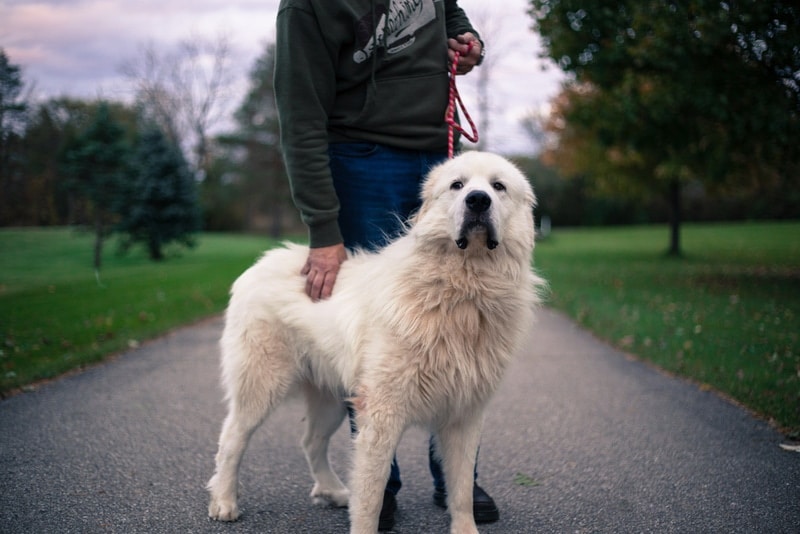In this article
View 2 More +Alongside the energy and affection they bring to the household, one of the top benefits a dog can offer is peace of mind. Dogs have been faithful guardians since the dawn of their domestication. Today, that loyal and protective nature shines through as we continue leaning on their might, keen senses, and courage to alert us to threats and keep our families and property safe.
The finest guard dogs are a purposeful combination of build and character, the product of thoughtful, informed breeding for a defined protective role. We’ll help you build a shortlist of candidates for your needs by exploring the traits and backgrounds of eight guard dog breeds.

How Are Guard Dog Breeds Classified?
Guard dogs can come from diverse working histories. Some breeds were multi-purpose helpers on farms, others protected flocks, and some acted as attack dogs against bandits and poachers. Many of these dogs remain valuable today for ranchers, security and police teams, and the military. But the unique loyalty defining a quality guard dog now makes them some of the most adored family companions.
It takes a special mix of temperament and talent for a dog to succeed as a guardian. While almost any dog can learn to bark when someone approaches, guard dogs need to be loyal, intelligent, watchful, and fearless to assess risks and respond accordingly. They must blend trainability and independence, all while sporting mighty frames that can defend against any threat.
The 8 Guard Dog Breeds
1. Bullmastiff

| Origin: | 1860s, England |
| Lifespan: | 7 – 9 years |
| Height: | 24 – 27 inches |
The Bullmastiff is a tailored mix of Olde English Bulldogge and the English Mastiff, an excellent guard dog in its own right, in a roughly 40/60 mix. Nicknamed the “Gamekeeper’s Night Dog,” the breed arose in England as a protector of estate grounds.
Poachers were commonplace, and gamekeepers needed a fearless yet clever dog to track and efficiently subdue anyone trespassing.
Gamekeepers needed a trainable yet independent-minded and courageous dog that had the power to pursue and manage human threats while being disciplined enough to avoid ripping into them once caught.
They succeeded on all fronts with the Bullmastiff, a powerful but laid-back companion in the modern home. Though not huge barkers, they remain alert and protective of their family.
2. German Shepherd Dog

| Origin: | 1890s, Germany |
| Lifespan: | 7 – 10 years |
| Height: | 22 – 26 inches |
As a jack-of-all-trades, the German Shepherd is an eager and skillful aid in nearly any discipline, from working dog jobs to protection to service and therapy roles. Initially a sheep-tending dog in their native realm, the breed gained notoriety in the early 1900s as a show dog and eventually a war dog in WWI.
They became media darlings soon after with dogs like Rin Tin Tin and have been among the most popular breeds since. The GSD’s commanding bark and muscular build are often enough to deter any would-be intruders, and they’re more than capable of springing into action when needed.
They’re intelligent, trainable, and focused, explaining why they’ve been a top choice for police and military service. But behind the toughness is an affectionate, energetic, and playful nature that active families adore.
3. Rottweiler

| Origin: | ~0–100 A.D., Germany |
| Lifespan: | 9 – 10 years |
| Height: | 22 – 27 inches |
Another versatile German breed, the Rottweiler, originated thousands of years ago when Roman legions brought their drover dogs to the country’s Rottweil region. The all-purpose breed began as a cattle guardian before expanding into herding and cart-pulling roles for local butchers.
In the early 1900s, Rottweilers were one of many intelligent and athletic breeds selected for police work. Individuals and businesses favored them for security, and they eventually became valuable for search and rescue and service jobs. By the 1930s, breeders saw their potential as loyal, loving family companions. The breed now sits among the top ten most popular dogs in the country.
4. Tibetan Mastiff

| Origin: | ~1000 B.C., Tibet |
| Lifespan: | 10 – 12 years |
| Height: | 24+ inches |
The Tibetan Mastiff only became AKC-recognized in 2006, but the imposing guardian breed has been around for millennia. Sporting thick, long coats, they were prized in the lofty Himalayas as guardian dogs for Buddhist temples. Experts believe most, if not all, large working breeds descended from them.
Tibetan Mastiffs largely stayed isolated in their mountain domain until the 1800s, when they finally made their way to Europe. Weighing up to 150 pounds, the dogs are exceptionally strong, and their long history of working with humans makes them as trustworthy and gentle as they are loyal and fearless.
5. Giant Schnauzer

| Origin: | 1800s, Germany |
| Lifespan: | 12 – 15 years |
| Height: | 25 – 27.5 inches |
The Giant Schnauzer originated as a drover’s dog and a stalwart guard. Developed to drive cattle, they evolved into multifaceted guards for butcher shops, stockyards, and taverns in Bavaria. As drovers became less common as technology evolved, the Giant Schnauzer’s intelligence and protective nature helped them remain useful as police dogs.
Giant Schnauzers are courageous, alert, and territorial, yet highly trainable and affectionate, and are an excellent breed for families. Given their high energy, they demand significant daily mental and physical stimulation to keep them happy.
6. Great Pyrenees

| Origin: | ~2000–1000 B.C., France |
| Lifespan: | 10 – 12 years |
| Height: | 25 – 32 inches |
The massive and majestic Great Pyrenees has been a dedicated protector in their native French mountain home for centuries. As a defender of their flock, the dog had a thick coat over their massive frame, blending in with the herd while staying protected from the harsh bite of the cold weather and even harsher bite of predators that would often attack.
The Great Pyrenees is gentle yet powerful and is a delightfully calm companion in the home. When necessary, they can quickly switch gears to dispatch nearly any threat. It isn’t uncommon to hear stories of Pyrs fending off grizzlies and packs of coyotes to protect their owners and livestock.
7. Akita

| Origin: | ~1000 A.D., Japan |
| Lifespan: | 10 – 14 years |
| Height: | 24 – 28 inches |
The Akita originated in medieval Japan, serving as large game hunters. They are incredibly loyal and fearless, and they efficiently tracked and bayed everything from bears to boars. As times changed, so did the Akita’s job, and they became property protectors and dog-fighting specimens until the 1900s.
Japanese culture reveres the Akita’s loyalty, courage, and proud character. Though wary of strangers and other animals, Akitas are affectionate with those they trust. With independent minds, persistence, and limited tolerance, they require an experienced leader offering quality training and socialization.
8. Boerboel

| Origin: | 1600s, South Africa |
| Lifespan: | 9 – 11 years |
| Height: | 22 – 27 inches |
The Boerboel is another Mastiff/Bulldog blend hailing from South Africa. The Dutch colonists, called Boers, who settled in the area in the 1600s, used the modern dog’s ancestors as multi-purpose farm dogs. They were bred for athleticism, bravery, and dedication, and they primarily worked to protect the homestead and help in the hunt.
Boerboels are among the more aggressive guard breeds, even facing bans in several countries. Their high energy demands a devoted and dominant owner who can offer activity and socialization to keep them even-tempered and well-behaved.

Are Guard Dogs Good Family Dogs?
Finding a safe and playful dog with family and friends but aggressive with burglars and other threats isn’t easy. It takes extensive training and a significant investment to develop a dog’s sense, restraint, and judgment to that point, which is more than the average owner would be willing to put in.
The right choice depends on your goals. For example, a livestock guardian dog like a Great Pyr or Anatolian Shepherd is ideal for large territories and independent work on a ranch. Meanwhile, a GSD can be a formidable force to deter burglars in the home. But if you only need a dog to stay on the alert and tell you someone is coming up the driveway, a Chihuahua is often more than sufficient.
For a family guardian, it’s usually best to err on the side of a calm, well-behaved, and socialized dog from a guardian breed. Though they may not get overly aggressive, their fearsome looks and alerting bark are often all you need to scare off would-be intruders.

Conclusion
A quality guard dog offers more than protection. Since they’re loyal and intelligent, these dogs become invaluable family members, providing all the mental and emotional benefits you expect from a beloved pet. It takes training, experience, and dedication to get the most from these hard-working breeds, but the peace of mind and companionship you earn make it worth every effort.
See Also:
- 10 Military Dog Breeds: Pictures, Info & History
- Central Asian Ovcharka: Info, Pictures, Facts & Traits
Featured Image Credit: Cody Hanson Photography, Shutterstock



















